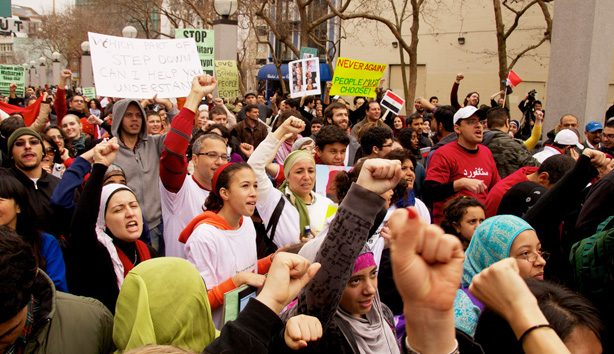Web Feature Posted March 17, 2011
Revolutionary Knowledge
SPU Students and Faculty Discuss Democracy in Egypt
By Hope McPherson (hmcpherson@spu.edu)

Supporters in San Francisco, California, marched on January 29, 2011, to show solidarity for those calling for democracy in Egypt. Photo by Steve Rhodes.
Seattle Pacific University may be 6,843 miles from Cairo, Egypt, but SPU students shortened the distance when they held two forums about the historic political changes rocking the Middle East.
By mid-February, two student forums had already provided the SPU community with an opportunity to hear from Egyptian nationals, Middle East experts, and SPU students who had recently studied there. “People in Egypt were rising spontaneously, and two different groups on campus rose up spontaneously to discuss it,” says Associate Professor of English Kimberly Segall, who focuses on international literature and has lived in Iraq.
Watching History Unfold
First, just a day before Egyptian President Hosni Mubarak stepped down, SPU students, faculty, and staff gathered for a briefing on Egyptian events. “Students have been fascinated to follow history in the making,” says Professor of History Don Holsinger, who specializes in Middle East and Islamic history. “Students were discovering for themselves how a ‘people’s revolution’ can be the best of times and the worst of times.”
Owen Sallee, coordinator of global and urban involvement in the John Perkins Center at SPU, initiated the February 10 briefing when world events overtook the Perkins Center’s planning of a short-term mission trip. “We intended to send a SPRINT team to Egypt this summer,” says Sallee. “But now our hosts there had other things to think about.”
Although the SPRINT trip had been cancelled, students continued asking questions about the unfolding events, the region’s recent history, and how they could pray for the region. In answer, Sallee invited Holsinger to give historical context, and SPU seniors Tyler Anders and Kelsey Hampton, who both studied in Cairo in 2009. “This was a case of a group of students demonstrating how to engage the world and change our culture,” says Holsinger.
Hampton — president of SPU’s newly formed Israel-Palestine student club and double major in political science and history — continues to follow the news. “We've heard reports of increased national pride and hope among the people of Cairo,” she says. “It's been really exciting to hear news from our friends, and to follow reports about the steps the country is taking to move forward.”
A New Generation’s Movement
With changes continuing to happen in Egypt, SPU junior Ruby O’Connor organized an additional forum. “I had just returned from Egypt and was having a hard time focusing on my studies,” says the political science major. “When you watch news clips of the streets where you walked a month ago and worry about your friends without Internet connections, revolutions seem much more real.”
To give her fellow students an opportunity to understand the events, O’Connor invited Segall and Ruth Ediger, associate professor of political science and geography, to put events in context and counter misconceptions about the Middle East. She also invited Maged Zahir, a Coptic Christian and engineer from Cairo, and Marwa Maziad, a University of Washington graduate student, to give their views on the changes in their homeland.
Maziad, recalls senior Caitlin Kincaid, explained how Mubarak didn’t reckon with the younger generation. “Maziad argued that the older generation of Egyptians was willing to tolerate Mubarak, and had he only had to deal with them, he might have remained in power forever,” she recalls. “But he forgot to reckon with the young people — and their dreams of a better life and aspirations for the future.”
The discussions about the sweeping changes in the Middle East have continued in Segall’s and others’ classrooms, adds Segall. “This enhances cultural engagement, and critical awareness in class is enlarged,” she says. “It’s been very exciting for college students to witness people of their own age taking to the streets,” she says.
